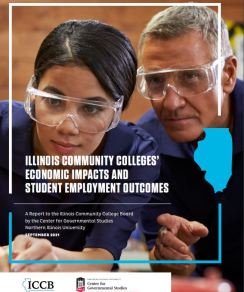On September 29, 2021, the Illinois Community College Board (ICCB) released the "Illinois Community Colleges’ Economic Impacts and Student Employment Outcomes" report. ICCB collaborated with the Center for Governmental Studies (CGS) at Northern Illinois University (NIU) on an in-depth analysis of how Illinois community colleges meet the needs of business and industry, equity, student outcomes, students’ return on investment, and the system’s overall economic impact to local economies and job growth.
In addition, the report examines statewide external factors impacting community colleges such as employment, population, race and ethnicity shifts, and the COVID-19 pandemic.
The report includes a number of significant findings on the return on investment in completing an Illinois community college certificate and/or degree. For example, long-term certificate or Associate in Applied Science (AAS) degrees yield an average annual rate of return of nearly 27%, with an average wage increase of nearly 40% one year after graduation. When examining race/ethnicity, African American graduates increased earnings by 88% and Latinx graduates by 119% three years after graduation.
Additionally, in analyzing students attaining short-term certificates, many programs yield substantial earnings gains three years after completion, including electrical and power transmission installers at $69,216, fire protection at $54,108, and HVAC and refrigerator maintenance at $48,708.
In examining the community college economic impact on the region as employment hubs and economic engines, results found that in fiscal-year 2020, the 48 community colleges in Illinois directly employed 32,867 staff members, with a total payroll of $1.3 billion. In addition to wages and salaries, Illinois community colleges account for approximately $500 million in additional expenditures, for a total of $1.8 billion in operating expenditures.
Beyond the effects of direct spending and employment, the Illinois community college system also strengthens the state's economy by supporting local workforce and economic-development services through employer and business engagement. In 2020, Illinois community colleges engaged with nearly 9,800 employers through program development/review, contract training, professional development, apprenticeships, and job placement.
Different from many other state and national higher education economic impact analyses, this study is unique because of the connectivity of ICCB Centralized Data System student-level data and Illinois Department of Employment Security (IDES) Workforce Longitudinal Data System employee-level wage data, which determines the economic impact of students through their actual employment and earning gains. The economic impacts of the Illinois community colleges were identified through employee-level data, operations expenditures, and capital expenditures from ICCB’s Centralized Data System and annual ICCB financial submissions.
Read the full report and view additional resources on the ICCB website.
Nathan Wilson is the deputy director for research at the Illinois Community College Board.
